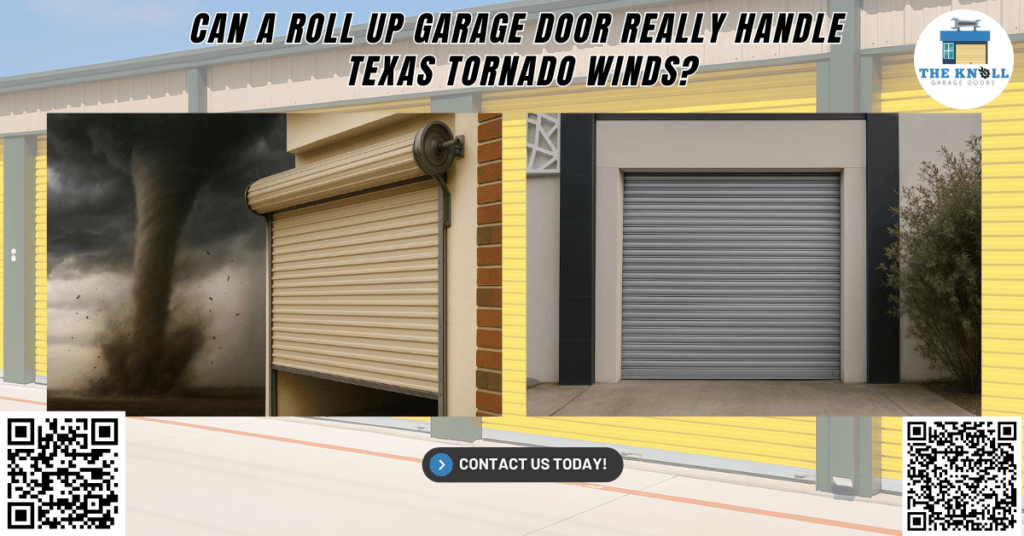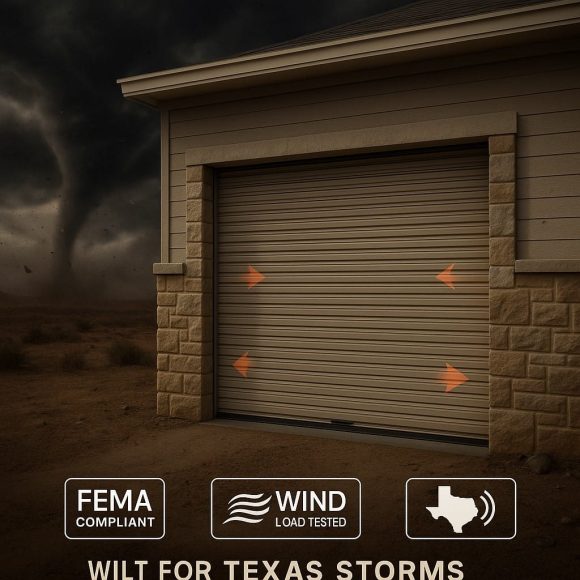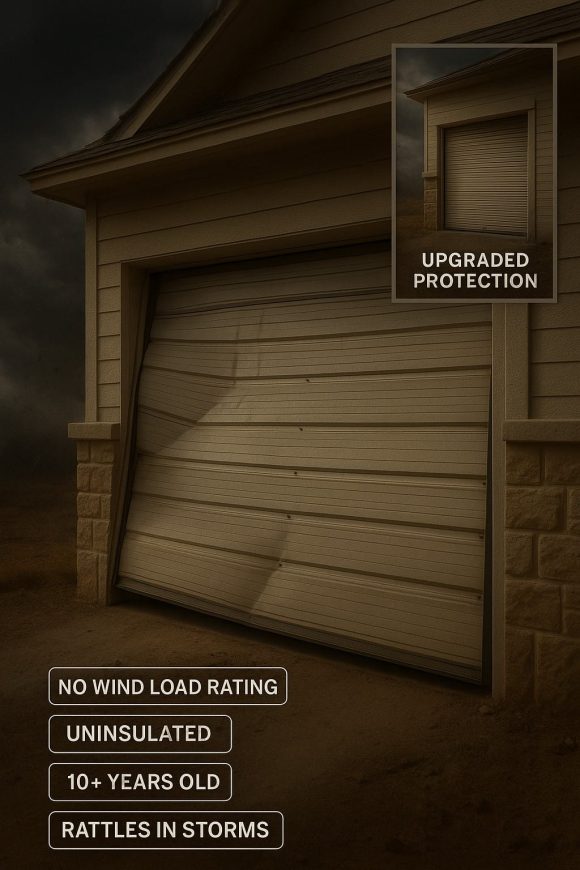Can a Roll-Up Garage Door Really Handle Texas Tornado Winds?

Last spring, we responded to an emergency in College Station. A customer’s non-insulated garage door had blown off during a surprise EF2 tornado, causing major damage to their garage space, tools, and even their car. The main issue? Their garage door wasn’t wind-rated or insulated for extreme Texas weather.
Texas sees over 130 tornadoes every year, and in storm-prone towns like College Station, the risk is real. High-speed winds, flying debris, and sudden pressure changes can rip apart buildings, especially garages. A poorly built or old garage door could be the weakest part of your home during a storm, leading to damage, energy loss, and safety hazards.
If you’re a homeowner or business owner relying on a basic, non-insulated door, you may be at risk. Let’s look at how roll-up garage doors perform during tornadoes, and how modern materials like steel, polyurethane, and polystyrene insulation can strengthen your defenses.
What Is a Roll-Up Garage Door?
A roll-up garage door is made from horizontal metal slats that coil tightly above the door opening. These doors are popular in commercial garages and storage spaces because they save room and offer solid security.
Unlike sectional garage doors, roll-up models don’t swing outwards. They’re ideal when garage space is tight or when you want a clean, compact design. Newer roll-up garage doors can even come with insulated panels, using materials like polyurethane foam or polystyrene to block heat and cold, reduce noise, and improve energy efficiency.
Can Roll-Up Garage Doors Withstand Texas Tornado Winds?
The short answer is: some can, if they’re built for it.
The strength of a garage door in high winds depends on:
- Insulation Material: Insulated garage doors with foam, fiberglass, or rigid panels provide more durability and weather resistance.
- Steel or Aluminum Construction: These materials help create a wind barrier while offering durability.
- Wind Load Ratings: Check the R-values and U-values, which measure how well the door resists heat transfer and pressure. A higher R-value means better insulation, while a lower U-value means better efficiency.
- Reinforcement Kits: Some garage door insulation kits include bracing systems for added support.
- Professional Installation: Even the best garage door won’t work well if installed incorrectly. Brackets, tracks, and rollers must be secure to avoid failure.

Roll-up garage doors that are wind-rated and energy-efficient can handle winds up to 150 mph, strong enough for most tornadoes in Texas. However, if you have a non-insulated door, it’s more likely to bend, warp, or collapse under pressure.
How Insulated Garage Doors Help in Tornado Season
Installing an insulated garage door, whether roll-up or sectional, provides big benefits:
✔ Better Structural Support
Insulated doors with polyurethane or polystyrene cores resist bending and help prevent pressure blowouts, keeping your roof and walls intact.
✔ Energy Savings
Insulated garage doors reduce energy loss, lower heating and cooling costs, and improve your home’s return on investment over time.
✔ Sound and Weather Protection
Materials like rigid foam, styrofoam, and fiberglass insulation help reduce noise from storms and traffic while resisting moisture, heat, and cold.
Common Door Types and Wind Safety
Not all doors are equal. Here’s how different types compare:
Door Type | Insulated? | Wind-Rated? | Best For |
Roll-Up Door | Optional | Yes (with upgrade) | Commercial or compact garages |
Sectional Door | Usually Yes | Yes | Homes, larger garages |
Single Panel Door | Rarely | No | Older homes (less safe) |
If you own an older non-insulated garage door, consider upgrading to a wind-rated, insulated model from brands like Amarr, Clopay, or Martin Garage Doors. These often include urethane foam, energy-efficient panels, and optional reinforcement kits.
Signs Your Garage Door Might Fail in a Storm
Worried your current door can’t handle severe weather? Watch for these red flags:
- It’s made of thin, uninsulated material
- It has no wind load or R-value rating
- It rattles or shakes during storms
- It’s 10+ years old with no recent upgrades

Such doors may leave your garage and your entire home at risk for structural damage, energy inefficiency, and high repair costs.
Upgrade Options for Texas Tornado Season
If your garage door isn’t up to the challenge, you have two main options:
🔧 Reinforcement Kits
Install garage door insulation kits, including batt insulation, rigid foam panels, or internal bracing. These are ideal for newer doors in good shape.
🚪 Full Replacement
Upgrade to a new garage door with foam insulation, steel or aluminum panels, and a certified wind load rating. This is the best long-term option for storm-prone areas.
You’ll gain better thermal transfer control, noise reduction, and energy savings, while protecting your home and family during Texas storms.
How Can The Knoll Garage Doors Help You?
At The Knoll Garage Doors, we specialize in insulated garage doors, wind-rated roll-up doors, and storm-proof installations. Our trained technicians proudly serve College Station and surrounding areas, helping homeowners and business owners stay safe through Texas’s toughest weather.
We offer:
- ✅ Free wind-readiness inspections
- ✅ Custom insulated garage door solutions
- ✅ Reinforcement and insulation upgrades
- ✅ Installation of top brands like Clopay, Amarr, and Martin
- ✅ 24/7 emergency garage door repair
Don’t leave your garage vulnerable. Let our team help you choose the best insulated garage door for both safety and energy efficiency.
📍 Visit us:
2322 Texas Ave S, College Station, TX 77840
📞 Call: (979) 978-0221
Secure your garage. Protect your home. Call The Knoll Garage Doors today!
Frequently Asked Questions (FAQs)
1. Do roll-up garage doors qualify for insurance discounts in tornado-prone areas?
Yes, many insurance providers offer discounts for wind-rated garage doors, especially in areas designated as high-risk for tornadoes or hurricanes.
2. Can I convert my existing non-insulated roll-up door to an insulated one?
In some cases, insulation panels or kits can be added, but full energy efficiency and wind resistance are best achieved by replacing the door entirely.
3. How do I know if my garage door is wind-rated?
Check for a label or sticker on the inside of the door that lists the wind-load rating, pressure rating, or compliance with local building codes.
4. Are insulated garage doors harder to open manually during a power outage?
Not necessarily modern insulated doors are designed with counterbalance systems, so they remain easy to lift even without power.
